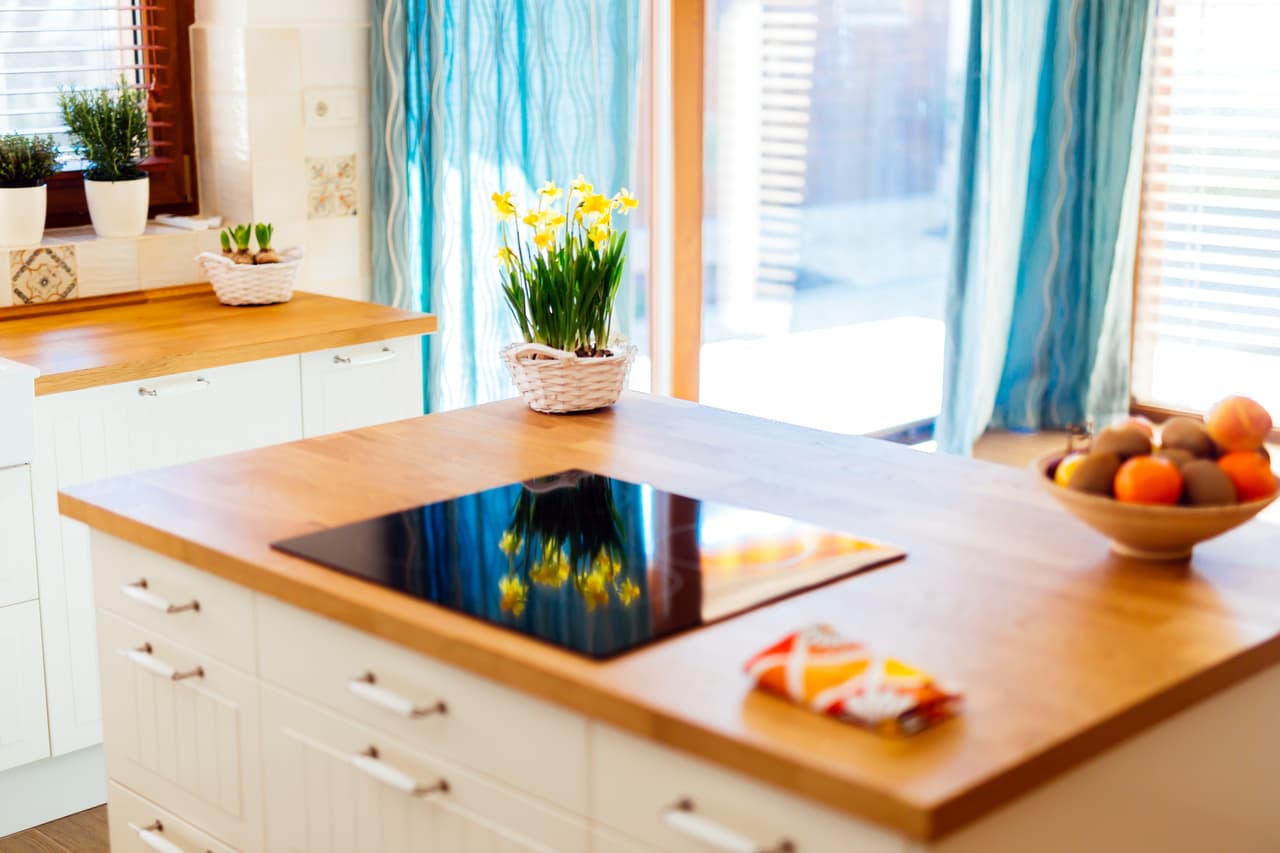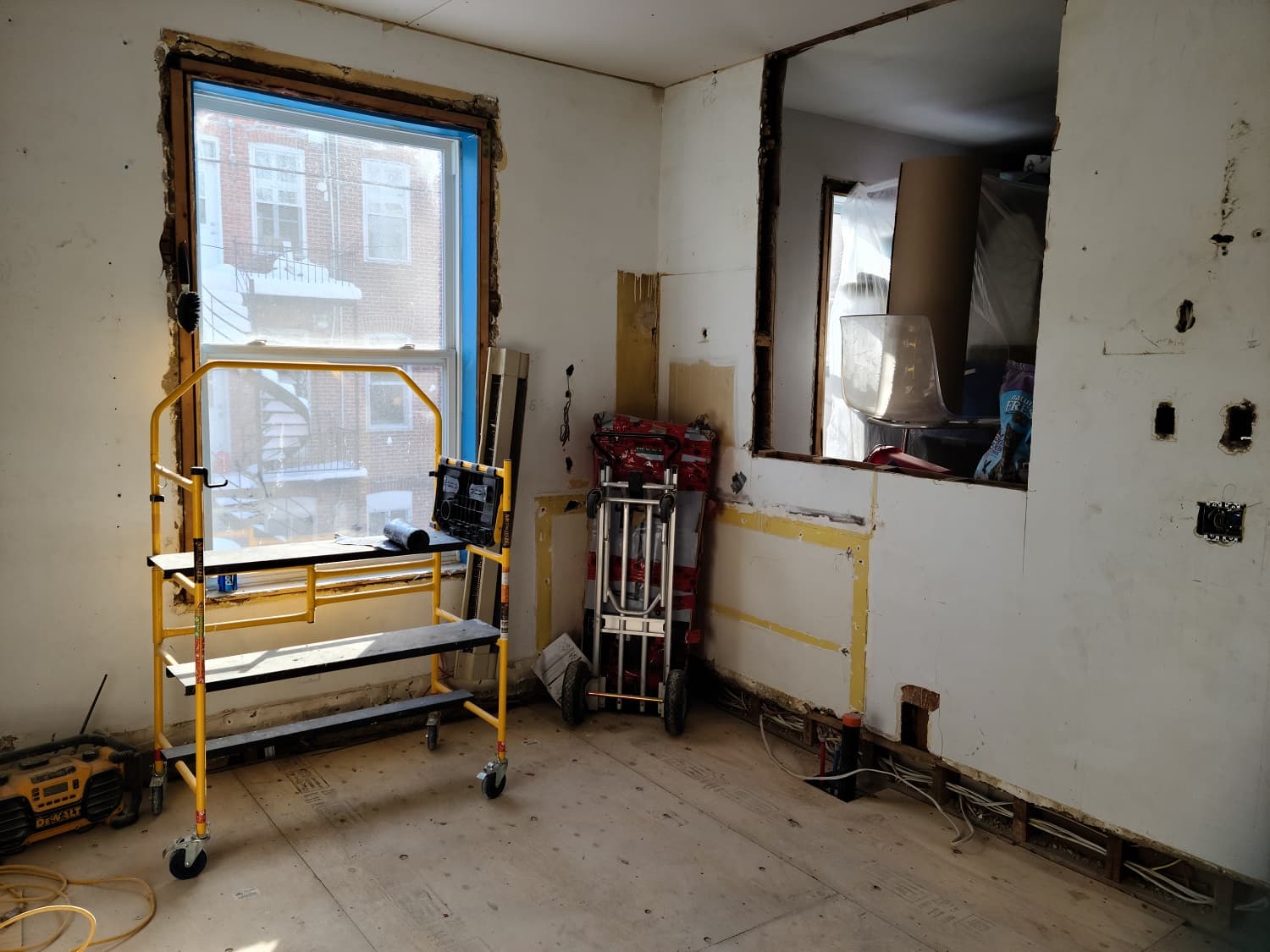
Stone kitchen countertops are certainly popular, but there are other alternatives to this type of material. If you're looking for the perfect match for your kitchen counter, it's understandable that you feel confused about all the options offered to you.
Remember that a kitchen counter must be both practical and aesthetic. Other criteria are functionality, strength, easy maintenance and durability.
Here, we'll present 7 materials to dress up your kitchen counter with their pros and cons!
7 Kitchen Countertop Materials that Aren't Stone

1. Laminate for an imitation of granite or wood
Laminate can be a good option if you are looking for an affordable counter to renovate your kitchen. This material offers several choices of colours and textures, including imitations of granite or wood.
Laminate kitchen countertops are made from sheets of craft paper. These sheets are hot-pressed, then glued on a support of particles, which brings life to magnificent laminate counters. The advantage with this type of material is how easy it is to install, since any person good with tools could easily install this kind of counter. The openings required to receive the sink and its faucets are also easy to achieve using a drill or circular saw.
In addition to being impact resistant, laminate is aesthetic and very easy to care for. Its only inconvenient is its sensitivity to heat, which is not very practical in a kitchen. Putting a pan or hot dish directly on the counter could damage it, knowing that it will be difficult to repair it in case of damage.
A laminate countertop will cost you about $6 to $30 a square foot.
2. Ceramic kitchen counter
Opting for a ceramic kitchen counter is having a choice between hundreds of tiles with a distinct design. Square, hexagonal, round, coloured, or patterned, there are some in all shapes and colours. Ceramic is a durable and resistant material. Being non-porous, it's difficult for dirt to embed itself in it.
Another bonus: ceramic is known to be scratchproof. You won't have to be afraid of leaving traces by dragging your pots and pans across your counter.
Ceramic countertops are inexpensive and offer good price value compared to natural stone countertops. However, this material also has disadvantages. One of the main problem with ceramic tiles is the risk of cracking when a heavy element falls on it.
A broken ceramic tile can't be repaired, so you'll have to replace it. However, as the shapes and colors highly vary, you'll need a stroke of luck to find the exact model. For this reason, you'll need to think ahead and buy extra tiles during the initial installation.
Allow between $14 and $48 per square foot for a ceramic kitchen countertop.

3. Metal countertop
Made from stainless steel, zinc, or copper, metal countertops are the professional benchmark for kitchen countertops, as these materials are frequently used in hotels and restaurants. Metal countertops are aesthetic and especially very hygienic, thanks to their non-porous aspect. These materials age very well, are easy to clean and are water and heat-resistant.
As these materials are mainly used in the professional field, the installation of a metal counter requires the intervention of a professional, which is quite expensive, especially since the adjustments are quite complicated to achieve.
Stainless steel is quite sensitive to scratches and fingerprints. As it tarnishes quickly, you'll have to polish it frequently to keep it in good condition. In addition, this metal is cold, noisy and not very charming for a family kitchen.
For the cost, expect between $72 and $144 per square foot for a metal countertop, depending on the material chosen.
4. Wood for an antique look
If you want an antique look to your kitchen, you absolutely need to replace your current counter for a wooden one. You will however need to choose carefully, as it has to be solid, resistant and durable. You will probably find your perfect match in the multitude of colors and grains offered. Tinted, varnished or oiled, there's a finish for everyone. The installation process can be easily done and doesn't necessarily requires the intervention of a professional.
The main inconvenient of a wood countertop is its fragility. For this reason, it's better to choose a solid wood like oak, teak, cherrywood or maple. Since wood doesn't react well to humidity, it's also preferable to mix it with an other water resistant material to keep it away from the sink.
Another inconvenient is that wood gets damaged easily if not properly cared for. However, fixing it is relatively easy since the contractor only needs to sand down the area to give the wood it's original aspect. It's recommended to wipe down any messes right away in order to prevent any marks and to apply a natural oil every three months or so to help it keep its shine. Prices vary between $12 to $110 per square foot depending on the wood chosen.
If you're renovating, head on to our countertop renovation guide.

5. Recycled materials
Recycled countertops are made of at least 75% recycled materials. Several patterns, colors, textures and opacity levels are available. This type of counter is eco-friendly, durable and resistant. In addition, it's easy to maintain and stain resistant.
Glass is part of those materials and will certainly be of interest to people with an ecological conscience. You'll soon agree that a glass countertop has a remarkable elegance. Its translucent and reflective effect will turn your guests red with envy.
Thanks to important developments in the field of glassware, you'll have a wide choice of colors and textures to match your glass counter to the rest of the room.
The glass will enhance the design of your kitchen for sure. Aside from its aesthetic appearance, glass is non-porous, making it an antibacterial material. This represents a considerable advantage in a kitchen, as the counter will always be in contact with food.
It can also be repolished in case of light scratches, but can also break under big shock, or during a significant thermal change.
The price for a counter made of recycled materials will be around $60 to $120 per square foot.

6. Synthetic materials
Synthetic materials are derived from petrochemicals: they're composed of plastic molds (polyester, acrylic, or mineral coatings). Many patterns, textures and colors are available. Synthetics are very resistant and blend completely in the environment. Indeed, it can be molded and installed so that no joints are visible and that the space for the sink is included.
Care for this type of counter is not very restrictive, a little soap water is enough for cleaning. It can even be sanded to clear any marks. However, synthetics are less resistant to heat and look more artificial than other materials such as granite.
Included in synthetic materials is corian. Known for its malleability, corian allows us to obtain many forms. Indeed, you can cut it, carve it and even melt it, reasons for which it is available in various forms of counters. Corian is easy to clean, antibacterial, non-porous and abrasion resistant.
Reserve about $60 and $180 per square foot for a kitchen counter made of synthetic materials.
To learn more about the prices of kitchen counters, read our article on the subject.

7. Concrete counters, solidity guaranteed
Concrete countertops are craft surfaces that offer complete customization. Mixed with pigments and cast in a mold, they can take any desired shapes and colors. The finish can be matte or glossy. It is a material that resists heat, shock and stains. You can obtain a modern and sophisticated result to accentuate your kitchen.
To be effective, concrete requires the application of a sealer because of its porous nature. It's essential to apply a product such as polyurethane or epoxy every 1 to 3 years. You can also apply wax as part of regular maintenance.
Concrete being a porous material, it won't resist wine, coffee and oil stains that could eventually stain it. In addition, the cycle of moisture and drying during the maintenance of the counter can cause cracks over the years. Another disadvantage of concrete: your porcelain and glass kitchen accessories won't hold up against this ultra rigid material.
Prices can run from $72 to $240 per square foot depending on the pigments added.
Rundown of Kitchen Countertop Price Points
Countertop Material | Price Per Square Foot |
|---|---|
Laminate | Between $6 - $30 |
Ceramic | Between $14 - $48 |
Metal | Between $72 - $144 |
Wood | Between $12 - $110 |
Recycled materials | Between $60 - $120 |
Synthetic materials | Between $60 - $180 |
Concrete | Between $72 - $240 |
Head over to our Kitchen Countertop Price Guide.
Looking for something else?
Related articles
The latest industry news, interviews, technologies, and resources.

Editorial Team
•06 Dec 2025
In order for a renovation project to go well, it is essential to attach great importance to the planning stage. If many of us agree with that statement, what exactly is the specific task at hand?

Editorial Team
•12 Feb 2026
If you’re stuck on “renovate or move,” you’re not alone. For many Canadian homeowners, the choice comes down to both numbers and real life: what you can afford, what your home is worth, what the market is doing, and how much disruption your household can handle.

Editorial Team
•08 Nov 2023
Spring is just around the corner, and this makes it the perfect time for planning out your garden, backyard and front lawn. If you’re working with plenty of space or you’re looking to investigate a little further into the potential of your property including growing your own vegetable and fruit garden, then you could be interested in working with a horticulturist. A horticulturist can help you plan and design a garden or recreational area with the idea of preserving natural resources.

Editorial Team
•23 Sep 2025
Are you an HVAC contractor in Montreal looking for new contracts? The heating, ventilation, and air conditioning market continues to evolve rapidly in 2025, driven by building modernization, energy efficiency demands, and residential renovations. To stand out, you not only need to provide high-quality services but also know where and how to find the right projects.

Editorial Team
•23 Jul 2025
Is your house not connected to a collection system, municipal sewer system, or sewage treatment system? That can only mean that you need another system to treat your wastewater, removing any concentration of impurities and other discharges produced. Said system is a septic tank, which is installed underground, not far from your house. To fulfill its vital role for health and environmental purposes, a septic tank must remain in good condition and compliant with current standards.